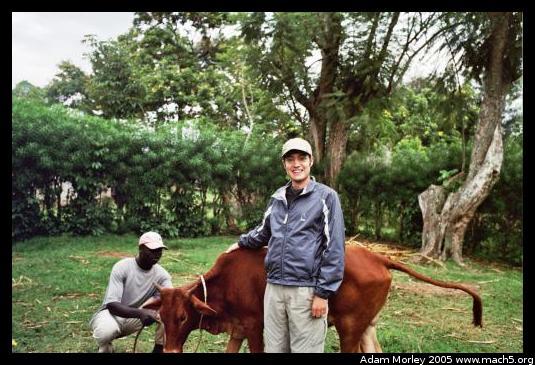
About a week before I was planning to leave Kenya to come back to the USA, I got to thinking of what I should leave behind as a thank you gift. I've never been one to do thank you gifts, but something locally made that both increased the quality of life of the Lubangas, and stimulated the local economy was clearly called for in this case. I made some inquiries into what other volunteers had purchased or given, and after careful thought I decided to buy a cow.
Why a cow? Chai tea, made with milk, is a popular drink in western Kenya. Mama Betty told me she spent (per year on milk alone) more than what a dairy cow cost. As with many other things in Kenya, access to capital is problematic, and most organizations subsist with little to no capital reserves.
The wise among you will immediately ask, "But what about lactose intolerance?" This question is well-founded, since it is widely known that lactose intolerance is quite high among African-Americans. As far as I can tell, it seems that most African-Americans can trace their roots to west Africans via the slave trade. This may not be entirely correct, but I do remember that milk consumption was effectively non-existent by the people I met in Senegal. What doesn't seem to be well-known is what the rate is among the people's of western Kenya. But then, it isn't even known how many people there are, let alone what type of enzymes their intestines produce. Since the family I stayed with was already consuming milk-based tea on a regular basis, I'm hoping that they aren't lactose intolerant. Plus, this cow will provide enough milk for the many visitors ICODEI has.
After speaking with Jackson and Peter about going and buying a cow, we picked a day and planned to leave at some horribly early hour, just after sunrise. It turns out this was two days before I was to leave Kabula.
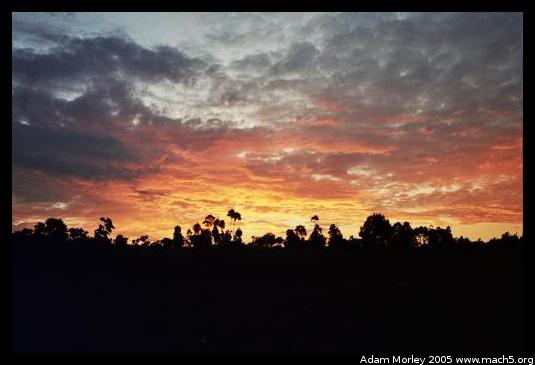
Sunrise on the big day.
We piled into one of the ICODEI vehicles, and headed for the gas station. If you haven't figured it out, every trip starts with a stop at the gas station. There, we filled up with $14 (about 3.5 gallons of gas) of gas and then drove for about an hour toward Uganda. Eventually, we entered (literally) a corn field and stopped near a mud hut. Here, we picked up a local so he could guide us to the market, and come along for the cow-buying experience. We drove for a bit longer, and came to a road that was literally filled with people walking any number of animals: cows, goats, sheep, chickens, turkeys, ducks, you name it and it was there. Since this is Kenya, people moved their livestock out of the way so we could pass --- after all, the animals don't pay for a road license, a Kenyan once said to me.
We finally arrived at the livestock market, and piled out of the Land Cruiser. As usual, I got a few double takes. I don't think they get many white guys at their livestock market. I asked about livestock market etiquette, and was informed that we should circulate around and try and stake out which cow we're interested in buying. So for about ten minutes, we just walked around and Peter would ask, "What do you think about that one?" To which I would reply, "It looks ok. But can we get a brown one?" This process (minus specifying an interest in a brown cow) repeated for a while, and then we tried to determine the price. Jackson and I just sort of stood there, since it was my first time at a livestock market and only his second. Peter, however, had been a few times before and knew how to negotiate. At first, we were quoted sky-high prices ($600 for a cow that should be $100), no doubt because the current cow owners detected money. Little did they know I only had about $170 with me for the cow.
I had to "go away" for a bit so that the price would come down (it helped that Peter was telling the cow sellers that I was a veterinary doctor who came along to look at the health of the Kenyan cows). I took the opportunity to snap a few photos, and take a look at the goats. Never before had I seen so many animals running around trying to procreate. Which was quickly curtailed by someone with a stick, as a pregnant cow is not as sale-worthy, apparently.
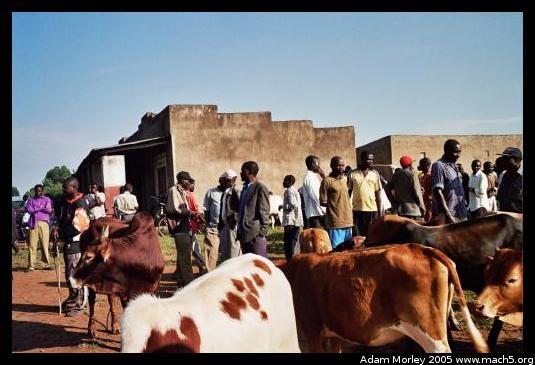
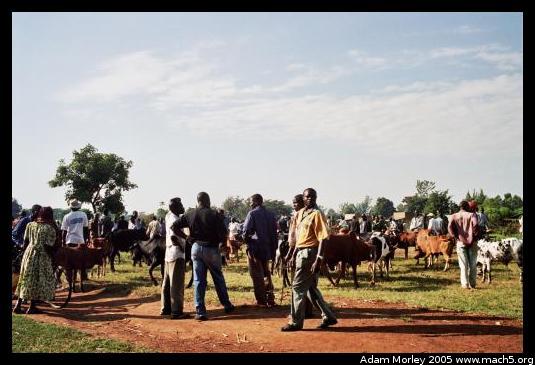
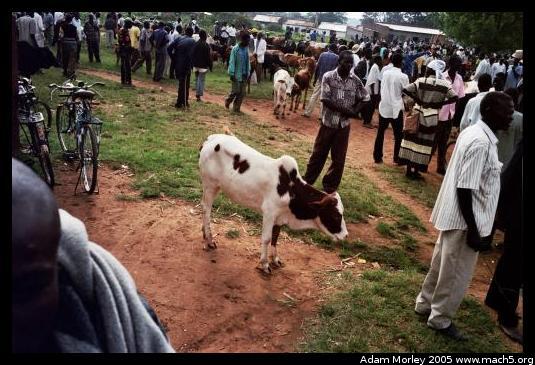
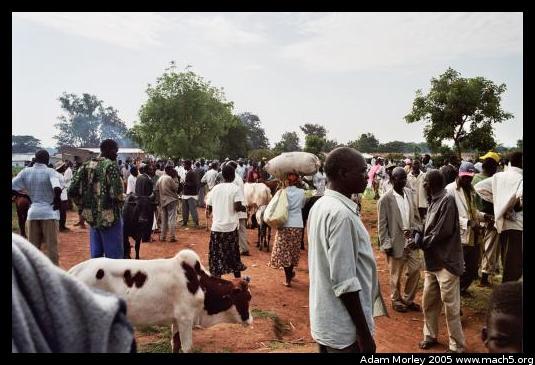
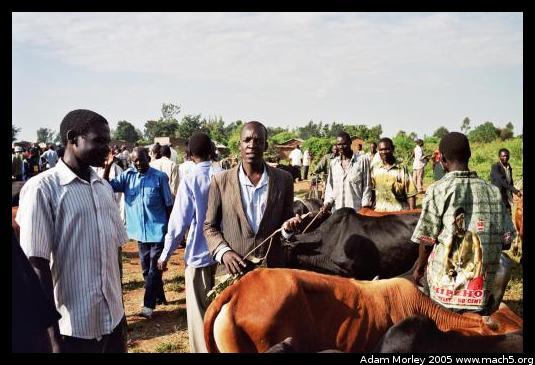
Some photos of the livestock market, all (save the last one) taken somewhat clandestine. The last one is a photo of a man named Donald from Amukura (north of Busia) who was selling his bull. If the Kenyan postal service gets my letter to him, then he has this picture. Small planet. The man on the left is Amon from Malaba. He buys cows for use in the restaurant business. Specifically, Nyama Choma which is "Meat + Salt + Fire = Yum," as one Kenyan put it. Nyama Choma is simply roasted beef, and quite well-regarded among Kenyans.
Most things in rural Kenya don't happen too fast. Livestock markets are quite different --- things happen quite quickly. On our first cow, we took far too long and another buyer snapped her out from under us. By the second cow, we were decisive. $170 later I was the proud owner of a brown, cross-bred female dairy cow.
For good measure, we went and bought two female chickens too ($3 for the pair). Interestingly, the four-legged animals are kept separate from the two-legged animals at the Kenyan livestock markets. When I inquired about this, they said they always kept them separate.
With two chickens in the back, we headed back to the farm. Where was the cow? In Kenya, one can pay a person to walk the cow back to your homestead. So a man who lived near the ICODEI farm walked the new cow back to ICODEI.
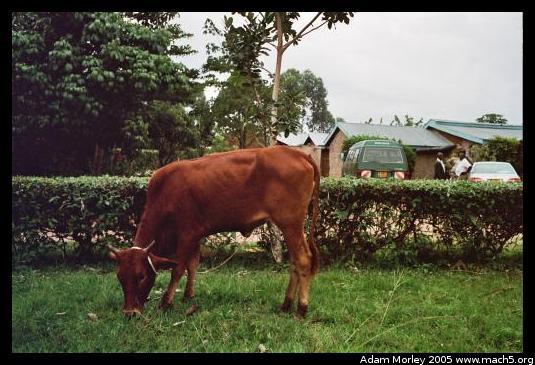
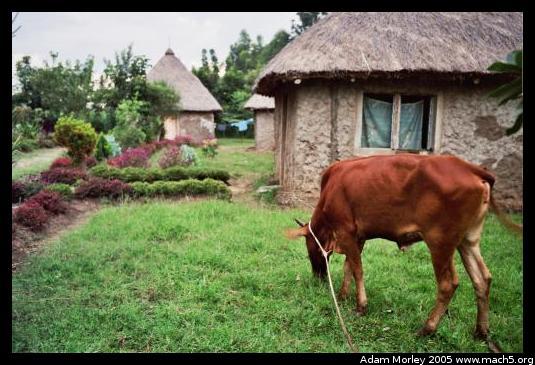
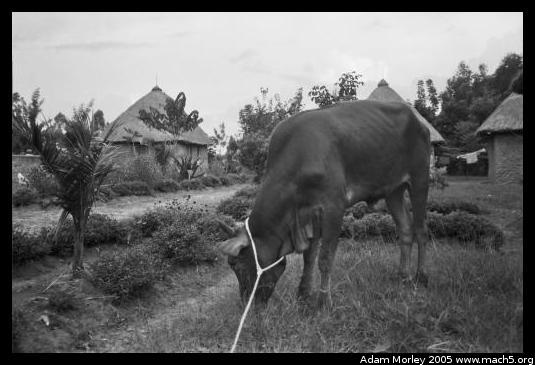
Seven hours later, the cow showed up at the farm. We stood around and talked cow talk. Then the cow ate a large amount of grass, and drank half a bucket (5L) of water.
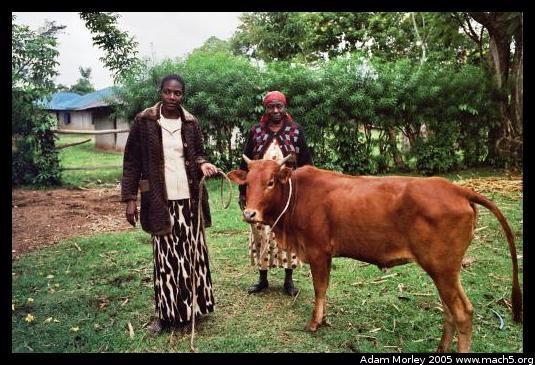
Mama Betty with Sophie (the cow) and Reuben's mom.
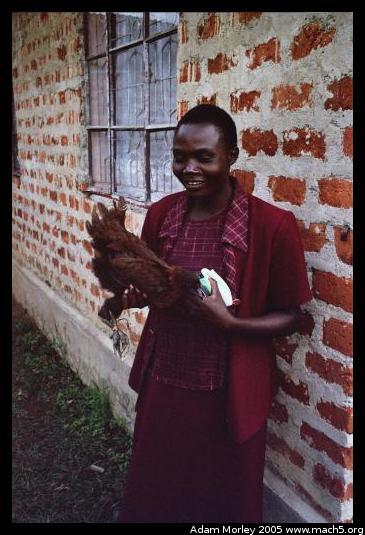
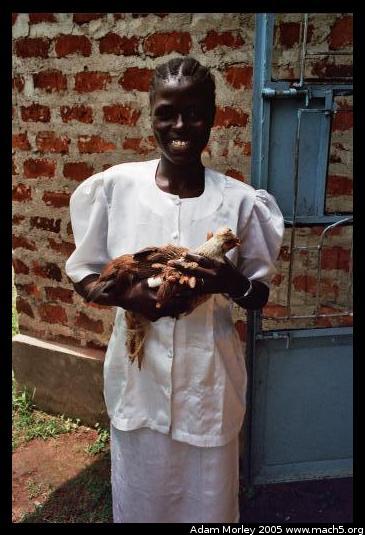
Jenn and Kristin with their new chickens. Jenn's chickens died, and Kristin didn't have one until now.
The day before I was to leave, Jackson and I went and scheduled the Sophie's vaccinations, bought a de-wormer, a multivitamin injection and some tick spray. Betty sent me a message to say that Sophie is healthy, is growing well and will soon be pregnant.
Adam can be reached at adam dot morley at gmail dot com